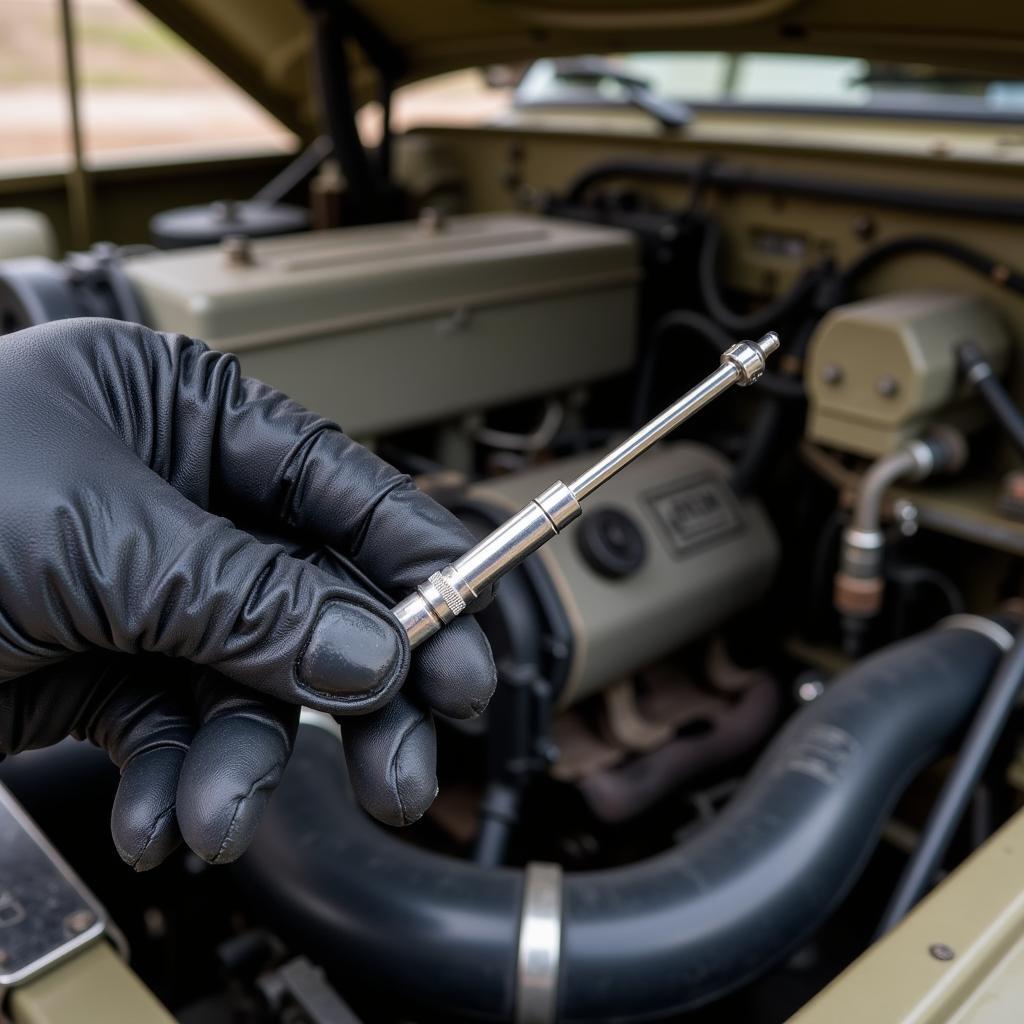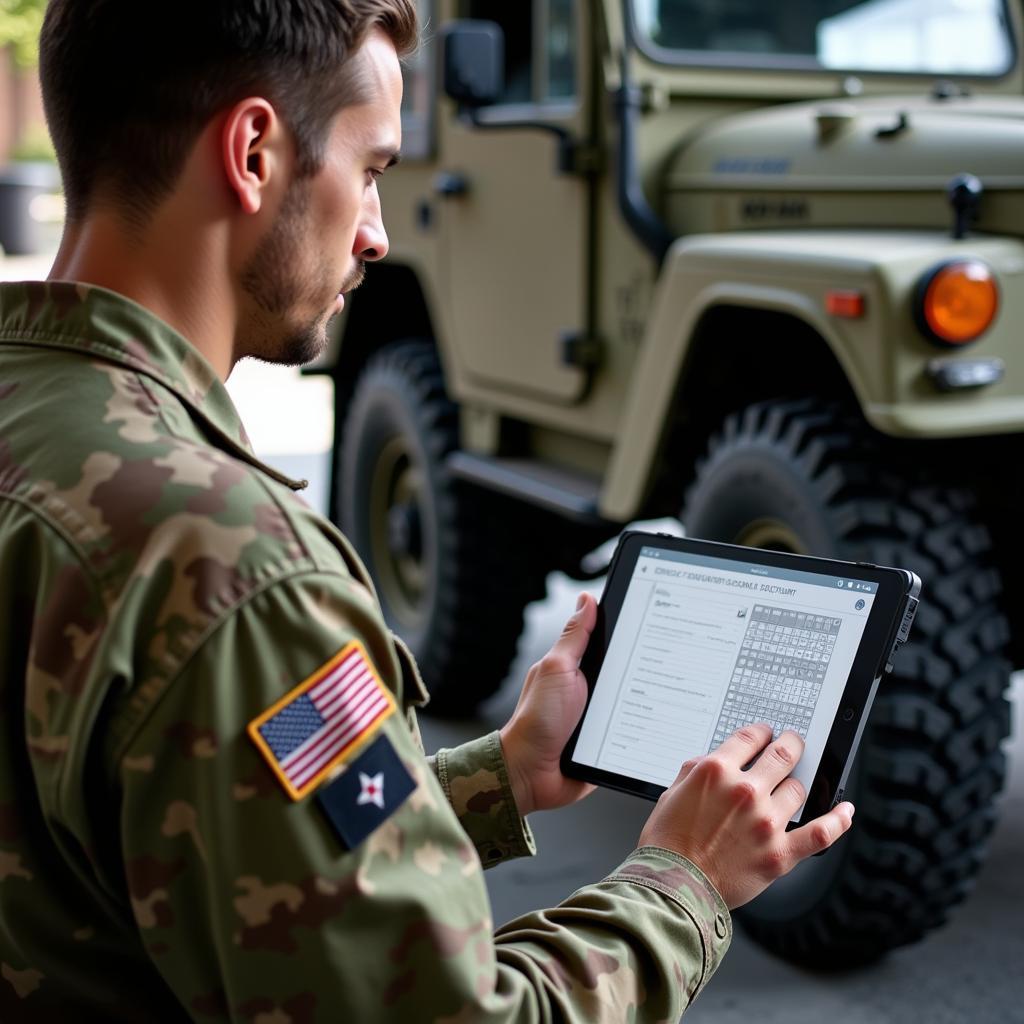Military Car Maintenance is crucial for ensuring vehicle reliability and operational readiness. Whether you’re a soldier maintaining your personal vehicle on base or a mechanic working on a fleet of military trucks, understanding the specific demands placed on these vehicles is key to their longevity and performance. This guide will delve into the nuances of military car maintenance, covering everything from routine checks to specialized repairs.
The Importance of Regular Military Car Maintenance
Regular maintenance is the backbone of any vehicle’s lifespan, but it takes on added significance for military cars. These vehicles often operate in harsh environments, facing extreme temperatures, rough terrain, and heavy loads. Consistent upkeep helps prevent breakdowns, extends the life of components, and ensures mission readiness. Ignoring regular maintenance can lead to costly repairs, decreased performance, and potentially jeopardize safety. Think of it like this: a well-oiled machine is a happy machine, and in the military, a happy machine can be the difference between mission success and failure.
Essential Checks for Military Car Maintenance
- Fluid Levels: Regularly check engine oil, coolant, brake fluid, power steering fluid, and transmission fluid. These fluids are the lifeblood of your vehicle and keeping them at the correct levels is vital.
- Tire Pressure and Condition: Maintaining proper tire pressure is crucial for fuel efficiency, handling, and safety. Regularly inspect tires for wear and tear, cuts, and punctures.
- Brakes: The braking system is arguably the most important safety feature of any vehicle. Regularly check brake pads, rotors, and lines for wear and tear.
- Lights: Ensure all lights are functioning correctly, including headlights, taillights, brake lights, and turn signals.
- Battery: A reliable battery is essential, especially in remote locations. Regularly check the battery terminals for corrosion and ensure the battery is holding a charge.
 Checking Fluids in a Military Vehicle
Checking Fluids in a Military Vehicle
Addressing Common Military Car Maintenance Issues
Military vehicles often encounter unique challenges that require specialized maintenance procedures. Understanding these issues and how to address them is crucial for maintaining operational readiness.
Dealing with Extreme Temperatures
Extreme heat and cold can wreak havoc on a vehicle. In hot climates, ensure the cooling system is functioning correctly and use appropriate lubricants. In cold weather, use a cold-weather-rated oil and consider using a block heater to prevent engine damage.
Navigating Rough Terrain
Rough terrain can put a strain on suspension components, tires, and the drivetrain. Regularly inspect these components for damage and ensure they are properly lubricated. Consider upgrading to heavy-duty suspension components if operating frequently in challenging off-road conditions.
Handling Heavy Loads
Hauling heavy loads requires proper attention to the braking system, suspension, and drivetrain. Ensure these components are in good working order and consider upgrading to heavy-duty parts if necessary.
Addressing Electrical Issues in Military Vehicles
Electrical systems in military vehicles can be complex. Troubleshooting these systems requires specialized knowledge and tools. Consulting a qualified military vehicle mechanic is often the best course of action for complex electrical issues.
“Regular preventative maintenance is far more cost-effective than reactive repairs,” advises Master Sergeant John Davis, a veteran mechanic with 20 years of experience working on military vehicles. “A little bit of preventative care goes a long way in keeping these machines running smoothly.”
Military Car Maintenance Best Practices
- Keep Detailed Records: Maintaining accurate records of all maintenance performed is crucial. This helps track service intervals, identify potential issues, and ensure warranty compliance.
- Use Quality Parts: Using high-quality parts designed for military applications can significantly extend the life of your vehicle and improve reliability.
- Follow Manufacturer Recommendations: Always consult the vehicle’s owner’s manual for specific maintenance recommendations and schedules.
 Maintaining Maintenance Records for a Military Vehicle
Maintaining Maintenance Records for a Military Vehicle
Conclusion
Military car maintenance is a vital aspect of ensuring operational readiness and maximizing vehicle lifespan. By following the guidelines outlined in this comprehensive guide, you can keep your military vehicle running smoothly and reliably, even under the most demanding conditions. Need expert advice? Reach out to Autotippro at +1 (641) 206-8880 or visit our office at 500 N St Mary’s St, San Antonio, TX 78205, United States.
“Remember, a well-maintained vehicle is a reliable vehicle,” says Staff Sergeant Sarah Miller, a seasoned military vehicle technician. “And in the military, reliability is everything.”
FAQ
- What are the most common maintenance issues in military vehicles? Common issues include problems with the cooling system, suspension, tires, and electrical system, often exacerbated by extreme temperatures and rough terrain.
- How often should I perform maintenance on my military vehicle? Consult your vehicle’s owner’s manual for specific maintenance intervals. However, regular checks of fluids, tires, and lights should be performed frequently, especially in demanding environments.
- What type of oil should I use in my military vehicle? Use the type of oil recommended in your vehicle’s owner’s manual. In cold climates, a cold-weather-rated oil is essential.
- Where can I find qualified mechanics to work on my military vehicle? Contact AutoTipPro for assistance in finding qualified mechanics specialized in military vehicle maintenance.
- What are the best practices for maintaining military vehicle maintenance records? Use a digital system or a dedicated logbook to record all maintenance performed, including dates, parts used, and the name of the technician.
- What are the benefits of using high-quality parts in military vehicles? High-quality parts are more durable and reliable, leading to fewer breakdowns and longer vehicle lifespan.
- How can I prepare my military vehicle for extreme weather conditions? Consult your owner’s manual for specific recommendations. In general, ensure your cooling system is functioning properly in hot weather and use a cold-weather-rated oil in cold weather.







Leave a Reply